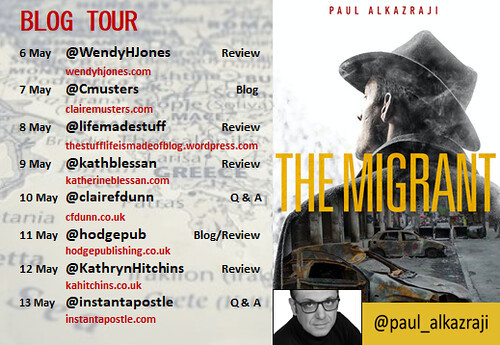Paul Alkazraji's Blog, page 4
November 6, 2020
A daughter of The Gardener
![kahitchins700g[1]-002](https://i.gr-assets.com/images/S/compressed.photo.goodreads.com/hostedimages/1552571608i/27205802.jpg)
Paul Alkazraji talks to novelist K A Hitchins about loss, identity and stories of redemption.

Tell us a little about yourself.
I live in Hertfordshire with my husband and two teenage children. I started writing in 2012 after two difficult experiences: the death of my father and giving up work to become a carer for a disabled member of my family. Although I was a Christian and knew that life wasn’t going to be all sunshine and roses, I struggled with the hand I’d been dealt. I became conscious of the most tremendous mental and emotional pressure. My job seemed to be about supporting everyone else while my overriding emotional experience was one of loss. I started to jot down my feelings at odd moments in the day, projecting my unhappiness on a fictional character in order to gain some perspective on my situation. After a couple of months of writing in secret, I discovered I’d finished my first novel, The Girl at the End of the Road.
The book was published in March 2016 by Instant Apostle, who also released my second novel in October 2016. The Key of All Unknown is the story of a woman who appears to be in a coma, but in reality is desperately trying to communicate with the outside world and discover who tried to kill her. My third novel, The Gardener’s Daughter, was published in March 2018.
As well as writing fiction, I speak to groups and creative writing classes, encourage other authors in their book promotion, act as Secretary and Trustee of a small charity training Christians in Togo in children’s ministry, and now also work 21 hours a week as a church administrator.
Tell us a little about your latest book.
The Gardener’s Daughter is about a girl who loses her father and runs away in search of her biological identity. As already mentioned, I had lost my own father a few years earlier and had struggled with a sense of losing my own identity. In many ways, the themes of the book resonated with my emotional life although the actual story couldn’t be further from the happy family life I experienced as a young adult. In The Gardener’s Daughter, my motherless nineteen-year-old heroine, Ava, accidentally discovers she’s adopted and in a fit of anger, runs away in search of her real father. What she discovers changes her life and her perception of herself forever.
Fiction writers put characters in dramatic situations ultimately to ‘say’ something. What are you saying in your latest work?
At the time of writing The Gardener’s Daughter I was volunteering in a Christian Union at a secondary school. I was struck by how difficult it is to explain the Gospel in a short space of time to youngsters who have very little Biblical knowledge. Whatever question they asked, the answer often needed to incorporate a potted overview of the Bible from creation, fall, incarnation, sacrifice, repentance, salvation and eternal life. All the best questions seemed to happen in the last few minutes of the sessions, and by the time a week had gone by the opportunity to continue the discussion had passed.
I decided to write a book which, on the surface would be a pacey thriller, but would in many ways be a biblical allegory explaining the grand sweep of the salvation narrative. In particular, I wanted to focus on our perennial search for identity, which is only truly found in relation to the Father heart of God. The book can be read at different levels. It’s an allegorical story and raises issues about the meaning and purpose of life, but on the other hand it’s a work of commercial fiction that can be read as a coming-of-age thriller.
Share with us a couple of sentences of your choice from your latest book.
Here’s a brief extract from chapter 1, where my heroine Ava remembers listening to her father digging in the garden.
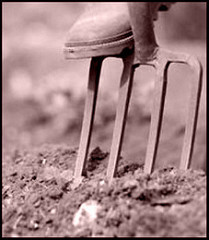 If I close my eyes I can still hear his spade cutting the soil with the rhythmic ticking of a clock, smell the damp peatiness of the earth. Then the quick rasping stabs of his fork as he turns the clods, worms recoiling at the invasion, until the soft, crumbling earth is ready for planting. The sound reminds me that some things have to be turned over and broken down before they are of any use.
If I close my eyes I can still hear his spade cutting the soil with the rhythmic ticking of a clock, smell the damp peatiness of the earth. Then the quick rasping stabs of his fork as he turns the clods, worms recoiling at the invasion, until the soft, crumbling earth is ready for planting. The sound reminds me that some things have to be turned over and broken down before they are of any use. I remember my last hours of ignorance as though they were yesterday. Not a blissful ignorance, because I thought I knew it all back then and was easily irritated by others. But at least I knew who I was and understood my place in the world. The thing with ignorance is you don’t know what you don’t know. I didn’t understand that knowledge can instantly change a life for good or evil. If I had, I might have reined in my impetuous nature. I know now that discovering the truth can open doors that slam shut behind you, doors through which you can never return. For me, the truth brought immediate, irredeemable pain. Discovering a bleeding hole where your heart should be will do that to you.
How does your faith influence your writing?
Although not overly Christian, all my books contain a story of redemption of some kind or another. I believe in a God who is a redeeming God – not only in the way He sent His son to take the punishment for our sins so that we can be forgiven and restored - but in the way He draws good out of the most difficult and painful situations. I’m not working towards a simplistic happy-ever-after in my stories. What I like to consider are those places we’ve all been in at times when we think we’ve lost everything and the only thing we are able to change is our perspective. We live in a culture that values success, status and possessions above all things, a world where the drive for personal fulfilment and individual self-expression can sometimes end up imprisoning us in a cycle of disappointment and despair. I hope to provoke my readers into rethinking some of the assumptions and philosophies that underpin their lives.
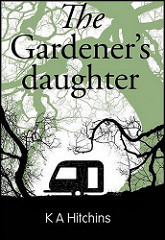
LINKS
www.kahitchins.co.uk
Twitter @KathrynHitchins
K A Hitchins, Author page
https://www.facebook.com/KathrynHitch...
By Paul Alkazraji:

Published on November 06, 2020 02:20
•
Tags:
christianity, fiction-writing, identity, k-a-hitchins, loss, redemption
October 1, 2020
A case of mistaken identity
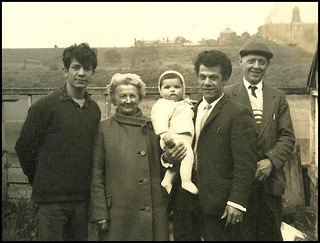
As I cycled along a city ring road once, my saddle was grasped from behind. A youth on a bike with cow horn handlebars scraped his shoe along the tarmac as he dragged us both to a standstill. He simply stared at me.
“What do… you want?” I said. He didn’t offer a word. His fist then slammed into my nose. He yanked back on his cow horns and wheelied off.
In the wake of the Black Lives Matter protests following the death of George Floyd, many previously silent people have given voice to their own experiences of racism. Like other mixed-race children growing up in England, I too felt a measure of it.
Another time, when I found a school door was locked, I tapped on the glass at a passer-by to let me in. He opened the door, showered me with a face full of spittle, locked it again and walked off. Sometimes, motives for actions were not stated; on other occasions, however, they were verbalised with venom.
I was aware then, though, that many English children were mistreated, often worse than me, for being different in some other way. Though my own experiences hurt, they were far outweighed by the friendship, help and affirmation I received from others in England as I grew up. Everyone needs to learn to forgive those who sin against them, as our own thoughts, words and deeds against others are forgiven.
When as an adult I moved to live and work with the church in Albania, I experienced racism from another angle: how some Greeks view those from their neighbouring country. When one Greek filling-station attendant eyed my Albanian car registration plate, I was actually refused petrol. I am stopped and questioned constantly by the Greek police on motorways, at road-toll stations and in supermarket car parks. Then, a cheerful ‘good morning’ and an offering of my British passport noticeably changes their attitude and my treatment.
This brings its own particular feeling of mistreatment: of being mistaken for something you know you are not. It perhaps gets to the crux of the matter: being seen as inferior, less human, potentially criminal even, on the basis of a wrong assumption. It has certainly made me more sympathetic to Albanians.
Many of these incidents of ‘mistaken racism’ were reworked into a novel I wrote called ‘The Migrant’. It tells the story of an Albanian youth who sets off to Greece in search of work and a better life, and three friends who set off to Athens to find him. There they encounter police brutality and casual racism on the roads, as well as populist rallies and organised attacks by a resurgent far right group.
On their way home, as the characters lament such struggles, they talk of a time and place where people of every race and nation will be welcomed and equally valued: where there will be no more crying and pain. Until then, there is longsuffering for so many, but it is eased with a sweet and certain hope that this place is prepared for us - and that we will get there.

'Racism... that's illogical captain!'
Paul Alkazraji's novel ‘The Migrant’ is published by Instant Apostle.
Find copies of ‘The Migrant’ here: https://www.amazon.co.uk/gp/product/B...

May 5, 2020
Road trip with 'The Migrant'
March 13, 2020
Baby, Baby
 Baby, Baby by Mari Howard
Baby, Baby by Mari HowardMy rating: 5 of 5 stars
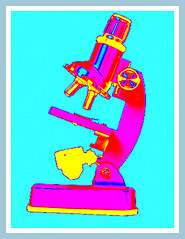
Max’s microscope. His father confesses his errors.
The story in ‘Baby, Baby’ follows the course of the relationship between two Cambridge medical students, Max Mullins and Jenny Guthrie, as the oddest of circumstances throws them back together. Jenny’s stepsister, Daisy, has given birth to a stillborn dysmorphic baby, and intrigue is raised as to just how - given that Jenny’s father has an embryo research clinic and that Daisy has visited its Colombian laboratory. Can they maintain detachment in the mutual magnetism as they investigate together?
As their relationship progresses they must deal too with the reactions of their families as Jenny, the Cornish secular humanist, encounters Max’s kin: Max is a devout Scots minister’s laddie. The author nicely raises questions about bigotry and broadmindedness and who in reality is guilty of what.
‘The course of true love never did run smooth’, and I liked the moment where Jenny bolts from Max’s engagement proposal by hitching a ride to the West Country in an AA recovery vehicle leaving Max temporarily dumped in the service station car park. There is nice descriptive writing such as a reception with ‘…stiff white cloth, porcelain army of tiny white cups and saucers – where delicately boned girls are serving real coffee from wide-bottomed Pyrex jugs.’ There is dialogue that will bring a knowing smile to any hospital patient’s face. ‘Everything they do here they do in kiddies’ medi-speak,’ says the no-nonsense Daisy. ‘Let me just pop this into your vein, can you cough for me, have you had a wee this morning?’ They laugh.’
‘Baby, Baby’ is a novel: not a genre medical romance. The writing is brisk and witty and Mari Howard has an astute awareness of people and their relationships that enables her to immerse the reader in an authentic and intelligent slice of family life.
By this reviewer:

View all my reviews
Published on March 13, 2020 03:07
•
Tags:
cambridge, embryo-research, medical-students
November 28, 2019
Sweet dreams...
 The Last Battle by C.S. Lewis
The Last Battle by C.S. LewisMy rating: 5 of 5 stars

Aslan: sweet dreams...
“I'd been having strange dreams about lions when I began writing the work,” says C.S. Lewis of Aslan, the Christ-like character who appears at the defining hour in this seventh and final novel in The Chronicles of Narnia: a fantasy series for children - and grown-ups.
It is a story of adventure, danger, suspense and hope with insightful parallels to the times in which we live in our world. Early on, Roonwit the Centaur warns King Tirian that strange and evil things are happening to Narnia, and that the stars portend ominous developments. We meet Shift the Ape, who opposes and substitutes himself in Aslan’s place by throwing a lion skin over a stiff-legged donkey, which he controls to dupe the Narnians: a clear parallel to the Antichrist in the Book of Revelation. We see too the folly of those who believe in no god at all who conflate good and evil by calling them one in ‘Tashlan’. “The Calormenes use different words but we all mean the same thing,” says the lying Ape.
We follow characters who face up to the reality that if Aslan were not the one they have believed in and longed for, it would be ‘as if the sun rose one day and were a black sun, or as if you drank water and it were dry’. We come upon a band of dwarfs whose faith in Aslan has been so undermined that they now live only for their own interests. They have become ‘so afraid of being taken in that they cannot be taken out’.
Then during the ‘last battle’ of the book’s title, fought before the door of a stable, we see the deep confusion present, and the faithful remnant hopelessly outnumbered. In such ‘last days’ that we live in, days of intensifying persecutions, rising emergencies and disasters, and where a person can ‘be howled down for saying that two and two make four’, just as the Narnians are when they question the Ape’s lies, there is much reality to rue in this fantasy fiction.
There is too the most vivid of scenes where all living creatures are called across the land to look straight into Aslan’s face. For some, their expressions change to fear and hatred before turning to Aslan’s left to disappear into his shadow. Others look on the face of Aslan and love him, and come in at the Door to his country.
Lewis’ use of certain language, considered mild in its day, has caused some critics to inflame themselves in their zeitgeist zeal to label him a racist, finding a nick and trying to drive a wedge in it. The notion of a true God above false ones and cultures who worship at their altars is an idea here that for some too is an offence beyond tolerance. There are warnings for all of us in Aslan’s shadow. Any dislike of the notion of it does not remove it from the Narnians.
In scenes to cherish, though, Aslan’s country is portrayed as richer in colour and more like the real thing than the Narnia they have always known. There, a great reunion of heroes and long-lost loved ones awaits. It is a place where the children who came to Narnia’s aid sprint further up and further in. ‘For them it was only the beginning of the real story… Chapter One of the Great Story which no one on earth has read’.
In Acts 2.17 it says: 'In the last days, God says… your old men will dream dreams.’ Not so strange, then, that it should be so for Lewis.
By this reviewer:

View all my reviews
Published on November 28, 2019 09:41
•
Tags:
aslan, c-s-lewis, christianity, narnia, the-chronicles-of-narnia
August 4, 2018
'The Migrant' to be published soon...
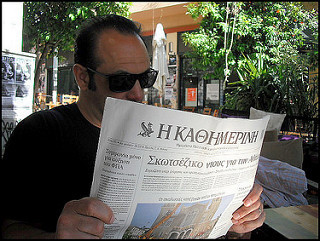
Some good news to share… I’m very happy to say that I just signed with a UK publisher for the novel I’ve been working on for a couple of years now – and finished, well, more or less. All being well, that should be out early next year. Hurray! (The photo is of me doing research for the story in Athens two years ago – well, pretending to read a Greek newspaper actually :) )
Early draft blurb for 'The Migrant' (working title).
‘No one has heard from Alban since he set off through the Albanian mountains to seek work illegally in Greece. Pastor Jude Kilburn is growing increasingly concerned. Could something have happened to the youth on route in the border forests? Could he remain safe in the Athens underworld if that was where he’d gone?
As the anti-austerity riots of 2012 explode, and the populist ‘Neo-Hellenic Front’ marches through the Greek capital, Jude gathers the help of two incompatible friends and sets off to find Alban. With him are Albanian Secret Service man Luan Gurbardhi, and reformed ex-criminal Mehmed Krasnichi. But can Jude keep his search party from falling apart?
When Donis Xenakis, a Greek riot-policeman and ‘Neo-Hellenic Front’ sympathiser, gets caught up in a diabolical plot to attack migrants, Jude could never have anticipated the unimaginable danger Alban is in. Nor can he foresee how a trafficked girl there will change all their outcomes.
‘The Migrant’ is a tense and evocative ‘road adventure’ with a powerful message and a tragic, yet ultimately redemptive, twist.’
Publisher: ‘Instant Apostle’.
Previously by this author:

Published on August 04, 2018 13:59
•
Tags:
2012, albania, anti-austerity-riots, athens, economic-crisis, greece, migration
November 18, 2017
A quest for the real truth surrounding a very big story indeed
 The Case for Christ--Student Edition, The by Lee Strobel
The Case for Christ--Student Edition, The by Lee StrobelMy rating: 5 of 5 stars
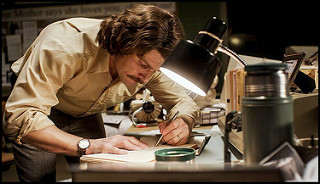
Lee Strobel investigates.
As someone who came to faith and then to journalism, the opposite way round from Lee Strobel, his story has always intrigued me. It is the true story of how an award-winning investigative journalist, the one-time legal editor of The Chicago Tribune, sets out to use his ‘particular set of skills’ to disprove the newfound Christian faith of his wife Leslie who stuns him with her announcement. "I rolled my eyes and braced for the worst,” he says, “feeling like the victim of a bait-and-switch scam. I thought she was going to turn into some sexually repressed prude… and spend all her time serving the poor in skid row somewhere.” His story is now a 2017 released film starring Faye Dunaway, known to an older generation for her roles in ‘The Thomas Crown Affair’ and ‘Bonnie and Clyde’, and Mike Vogel in the role of the reporter on a quest for the real truth surrounding a very big story indeed.
In the book Strobel sorts through the evidence of the case for or against Christ that he uncovers over the subsequent year and nine months. He begins with whether Jesus, himself, really thought he was God looking at such ‘blasphemous’ statements as: ’I and the Father are one’ in John 10. He moves on to the quantity of Old Testament prophecy Jesus manages to fulfil, like Zechariah 9:9, asking if Jesus was just trying to add to his Messiah credentials when he said to the disciples, ‘Go fetch me a donkey’. But then he asks how he could arrange the place of his birth, predicted by the prophet Micah in chapter 5:2. He finds too the ‘129 hours of eyewitness testimony saying Jesus came back to life’ that addresses the question: How do we know for sure whether the Resurrection happened?
He examines the external corroboration of biblical accounts through historians like Josephus, Tacitus, Pliny and the Talmud, and also through archaeology citing Sir William Ramsey of Oxford University who concluded that Luke was one of the most accurate historians who had ever written. He reads through ‘words that work when put into practice again and again in the areas of finance, stress and character qualities’ that lead him to ask if it is possible that the Bible really is God’s inspired word. He discovers the ‘final confirming proof’ of encounters with Jesus today, citing philosophy professor J P Moreland: “It’s the ongoing encounter with the resurrected Christ that happens all over the world, in every culture, to people from all kinds of backgrounds and personalities. They will all tell you… Jesus Christ has changed them.”
The book presents intelligent evidence for consideration, and this student edition has a light and accessible treatment. It sits alongside other key works of modern popular apologetics such as Frank Morrison’s ‘Who Moved the Stone?’ Josh McDowell’s ‘Evidence That Demands a Verdict’ and J Warner Wallace’s ‘God's Crime Scene’. In times of such social division, where groups can dismiss Christ on account of their perceptions or experiences of his followers, this book offers a good way back to foundations, to Jesus himself, and to the crucial question of what to make of the Bethlehem babe.
In the end, Lee Strobel tells his wife of his conclusion: he can no longer swim upstream against the evidence. “Instead, I was going in the same direction as the facts seemed to be flowing,” he says. She starts crying and in language befitting any Chicago news room says: "You hard hearted son-of-a-*, I've been telling you this for two years…" Touché.
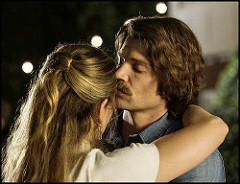
By this reviewer:

View all my reviews
Published on November 18, 2017 04:44
•
Tags:
apologetics, investigative-reporting, journalism
May 25, 2017
A chink of light in the noir

Wendy on her radio show: Wendy's Book Buzz.
Paul Alkazraji talks to Scottish crime writer Wendy Jones about murder in Dundee, her curse-averse detective Shona McKenzie, and laughing out loud on public transport…
Tell us a little about yourself.
I’m from Dundee in Scotland and love living there. When I was eighteen, I joined the Royal Navy to do Nurse Training. I then joined the Army as a Nursing Officer and served for a further seventeen years. I left with the rank of Major, which I still hold and will keep until the day I die. This took me all over the world with postings to Hong Kong, Germany, Israel, Cyprus and Gibraltar. My passions are reading, writing and travel - preferably all three together. Funnily enough, I seem to manage this with amazing regularity.
Tell us a little about your DI Shona McKenzie Mysteries.
In each of the books DI Shona McKenzie is on the hunt for a serial killer, and she is feisty, funny, smart and sharp with it. The books are unusual in that the reader gets to see the viewpoint of both the killer and the police. This means they discover the motivation behind the killings. They are part of the Tartan Noir genre of crime fiction.
Is there an aspect of them you are particularly pleased with?
I like the characters and their dialogue. I also like the fact there is humour in the books as a balance for the darker aspects.
Share with us a sentence of your choice from one of them.
This is the opening sentence from Killer’s Cut.
Despite the green-eyed man driving the old Mercedes Benz carefully up the steep mountain road, the human leg still rattled around in the boot.
Tell us about something you like or dislike in one of your characters.
Detective Constable Roy MacGregor is a nasty piece of work in the first few books. He is young and arrogant and this comes across in his reactions to people. He has improved a bit but still tends to fly off the handle. However, he’s a computer genius so Shona needs him in her team.
Fiction writers put characters in dramatic situations ultimately to ‘say’ something. What are you saying in your latest work?
The latest book in the series is Killer’s Crew. It starts with a hanging on a ship. Given the size of Dundee, which is described as the biggest village in the world, the body count is high. Whilst not overtly so, I guess I am saying that evil lurks not far beneath the skin of the city. However, good ultimately wins as the police catch the bad guy.

Dundee Postcard: 'evil lurks not far beneath'.
How does your faith influence your writing?
Whilst I am a Christian, my books are not. They are written for a secular market but can be read by anyone. Given it is a crime book there is violence, however there is no sex or swearing. Balanced with this is the need for authenticity, and I get around the swearing by having Shona totally against it. She won’t tolerate it.
How do you approach the ‘tartan noir’ of your genre through the light of your faith?
I need to ensure I make it as realistic as possible. My take on it is that evil exists. Christian or not we cannot shy away from that. I hope I handle it sensitively, especially when DI Shona is dealing with the relatives and friends of the victims.
What aspect of the craft of writing do find most enjoyable?
I love words with a passion. So my favourite part of writing is shaping those words into an order which makes sense and brings joy to readers.
What books or authors do you like to read?
All the Scottish crime writers such as Ian Rankin, Val McDermid, Alex Gray, Lin Anderson, Caro Ramsey, James Oswald and many others. I also like the Scandinavian Noir Writers, and American Crime Writers Kathy Reich and Patricia Cornwall. James Patterson and Janet Evanovich are particular favourites.
What are you most thankful for in life?
I’m thankful for my health. For many years, I was ill to the point of disability and this impacted my life to quite a degree. I seem to be fully recovered now and I am eternally grateful for that. I am also thankful that I can write and that readers enjoy my books. That is a true privilege.
What makes you laugh?
A lot of things including the antics of children, jokes and television programmes. The Janet Evanovich books often make me laugh out loud, which can be a bit odd if I am on public transport. I am currently writing a new series called The Cass Claymore Mysteries, which is a humorous PI series. That’s making me laugh. I hope it makes everyone else laugh too.
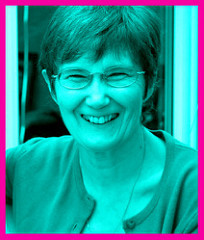
Author Wendy H. Jones.
Website: http://www.wendyhjones.com
Amazon author Page: Author.to/WendyHJones
Twitter: http://twitter.com/wendyhjones
Facebook: https://www.facebook.com/wendyhjonesa...
By Paul Alkazraji: >>>

Published on May 25, 2017 06:20
•
Tags:
di-shona-mckenzie, dundee, ian-rankin, kathy-reich, murder-mystery, scottish-crime-writers, tartan-noir
May 4, 2017
Listen to the soundtrack of ‘The Silencer’
Listen to the soundtrack of ‘The Silencer'.

Michael Caine demonstrates how a proper omelette is made in ‘The Ipcress File.’
Can a book have a soundtrack? Well, perhaps only in the mind of the writer. But if you like a little music, or are just curious, you might find a listen to some of these songs adds another layer of flavor to the scenes in which they are mentioned. Here are some YouTube links to the ‘track list highlights’. Just click and listen!
In Chapter 22, the protagonist, Jude Kilburn, attempts what was probably not the most impressive impersonation of actor Michael Caine in ‘The Ipcress File’ using a honeydew melon. John Barry’s score evokes quintessential Sixties espionage coolness. http://www.youtube.com/watch?v=pBCqP7...
Alex Kilburn sings a song made famous in the film ‘Oh Brother, Where Art Thou?’, ‘Down to the River to Pray’, in the final chapter as goatherd boy Liridon takes a step of faith. Here Alison Krauss sings it.
http://www.youtube.com/watch?v=DbgfQ4...
Working off the premise that most people carry the pop music of their youth with them through their lives, I was looking for something that Alex Kilburn might sing that would speak about her mood in Chapter 9, as the pressures of life in a far away land mount up on her. Unlike myself, the Kilburns were students in the ’90s, and so I found it in Travis and ‘Why does it always rain on me?’
http://www.youtube.com/watch?v=PXatLO...
Just before tensions flare up between the married couple, Alex Kilburn sings the traditional gospel song ‘This Train is Bound for Glory’ in Chapter 17. This was my original choice for the title of the book, reflecting key elements of the story in both Jude’s and the antagonist’s lives. The sound quality of Sister Rosetta Tharpe’s version is poor… so turn it up!
http://www.youtube.com/watch?v=jOrhjg...
As Jude rides a ‘furgon’ (a minibus taxi) to the village of Shënvogël in Chapter 10, the driver puts The Human Leagues’ ‘Don’t you want me’ on the CD player. Surprising connections between them ensue and then the sing-along begins. “Such a clean sound,” says the Albanian driver.
http://www.youtube.com/watch?v=uPudE8...
With a suggestion of ‘His mercies’ that are to crown the story and enable Jude’s mission to succeed, Alex again sings this evergreen hymn in the final chapter. I stumbled upon these two ‘dudes’ giving it a really nice treatment: ‘Great is Thy Faithfulness’.
http://www.youtube.com/watch?v=hwWtWK...
By this author:


Michael Caine demonstrates how a proper omelette is made in ‘The Ipcress File.’
Can a book have a soundtrack? Well, perhaps only in the mind of the writer. But if you like a little music, or are just curious, you might find a listen to some of these songs adds another layer of flavor to the scenes in which they are mentioned. Here are some YouTube links to the ‘track list highlights’. Just click and listen!
In Chapter 22, the protagonist, Jude Kilburn, attempts what was probably not the most impressive impersonation of actor Michael Caine in ‘The Ipcress File’ using a honeydew melon. John Barry’s score evokes quintessential Sixties espionage coolness. http://www.youtube.com/watch?v=pBCqP7...
Alex Kilburn sings a song made famous in the film ‘Oh Brother, Where Art Thou?’, ‘Down to the River to Pray’, in the final chapter as goatherd boy Liridon takes a step of faith. Here Alison Krauss sings it.
http://www.youtube.com/watch?v=DbgfQ4...
Working off the premise that most people carry the pop music of their youth with them through their lives, I was looking for something that Alex Kilburn might sing that would speak about her mood in Chapter 9, as the pressures of life in a far away land mount up on her. Unlike myself, the Kilburns were students in the ’90s, and so I found it in Travis and ‘Why does it always rain on me?’
http://www.youtube.com/watch?v=PXatLO...
Just before tensions flare up between the married couple, Alex Kilburn sings the traditional gospel song ‘This Train is Bound for Glory’ in Chapter 17. This was my original choice for the title of the book, reflecting key elements of the story in both Jude’s and the antagonist’s lives. The sound quality of Sister Rosetta Tharpe’s version is poor… so turn it up!
http://www.youtube.com/watch?v=jOrhjg...
As Jude rides a ‘furgon’ (a minibus taxi) to the village of Shënvogël in Chapter 10, the driver puts The Human Leagues’ ‘Don’t you want me’ on the CD player. Surprising connections between them ensue and then the sing-along begins. “Such a clean sound,” says the Albanian driver.
http://www.youtube.com/watch?v=uPudE8...
With a suggestion of ‘His mercies’ that are to crown the story and enable Jude’s mission to succeed, Alex again sings this evergreen hymn in the final chapter. I stumbled upon these two ‘dudes’ giving it a really nice treatment: ‘Great is Thy Faithfulness’.
http://www.youtube.com/watch?v=hwWtWK...
By this author:

Published on May 04, 2017 12:59
•
Tags:
albania, alison-krauss, daniel-doss, joel-norman, john-barry, michael-caine, oh-brother-where-art-thou, sister-rosetta-tharpe, the-human-league, the-ipcress-file, travis
February 18, 2017
‘Geez Louise!’ How Good is God!
 Walking with God: Talk to Him. Hear from Him. Really. by John Eldredge
Walking with God: Talk to Him. Hear from Him. Really. by John EldredgeMy rating: 5 of 5 stars

In the intro John Eldredge writes: ‘Really now, if you knew you had the opportunity to develop a conversational intimacy with the wisest, kindest, most generous and seasoned person in the world, wouldn’t it make sense to spend time with that person, as opposed to, say, slogging your way through on your own?’ Too right it would. ‘Geez Louise!’
‘Walking with God’ is a journal of the author’s walk with Him through a year distilled into episodic learning moments. It begins with laying out the Biblical case for the availability, and desirability, of an intimate personal relationship with the Lord. He accounts for how that ‘inside information’ from Him, at crucial times of personal decision making, is the astonishing privilege of being a child of the Father, and makes all the difference.
There are scenes about ‘Making room for joy’ in your life, being willing to ‘Check under the hood (car bonnet) of your soul’, ‘Missing the good that God is giving you’ and ‘On the things that He withholds’. As we walk with the author, he makes himself vulnerable as he struggles with the comfort of a nightly drink, tries to get a decent night’s sleep, and falls off his horse.
Eldredge is a very well-read writer with a knowledge of literature, and film, that add other layers of interest to his work. He’s an undergrad in theatre, with a Masters in Biblical counselling, and influenced by Francis Schaeffer. Yet there is a pick-up-truck-loving, outdoorsy manliness about him that gives him an everyman accessibility as he watches hawks and scouts for elk with his boys on a Colorado ranch. ‘Geez Louise!’ he says. And as an expression of delight in God’s goodness, you might find yourself saying it along with him too.
By this reviewer:

View all my reviews
Published on February 18, 2017 04:51

